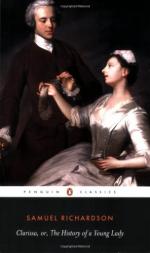Thus also Horace, and the politest Romans in the Augustan age, wished to be affected:
Ac ne forte putes
me, quae facere ipse recusem,
Cum recte tractant
alii, laudere maligne;
Ille per extentum
funem mihi posse videtur
Ire poeta, meum
qui pectus inaniter angit,
Irritat, mulcet;
falsis terroribus implet,
Ut magus; & modo
me Thebis, modo point Athenis.
Thus Englished by Mr. Pope:
Yet, lest thou
think I rally more than teach,
Or praise malignly
arts I cannot reach;
Let me, for once,
presume t’instruct the times
To know the poet
from the man of rhymes.
’Tis he
who gives my breast a thousand pains:
Can make me feel
each passion that he feigns;
Enrage—compose—with
more than magic art,
With pity and
with terror tear my heart;
And snatch me
o’er the earth, or through the air,
To Thebes, to
Athens, when he will, and where.
Our fair readers are also desired to attend to what a celebrated critic* of a neighbouring nation says on the nature and design of tragedy, from the rules laid down by the same great antient.
* Rapin, on Aristotle’s Poetics.
‘Tragedy,’ says he, makes man modest, by representing the great masters of the earth humbled; and it makes him tender and merciful, by showing him the strange accidents of life, and the unforeseen disgraces, to which the most important persons are subject.
’But because man is naturally timorous and compassionate, he may fall into other extremes. Too much fear may shake his constancy of mind, and too much of tragedy to regulate these two weaknesses. It prepares and arms him against disgraces, by showing them so frequent in the most considerable persons; and he will cease to fear extraordinary accidents, when he sees them happen to the highest part of mankind. And still more efficacious, we may add, the example will be, when he sees them happen to the best.
’But as the end of tragedy is to teach men not to fear too weakly common misfortunes, it proposes also to teach them to spare their compassion for objects that deserve it. For there is an injustice in being moved at the afflictions of those who deserve to be miserable. We may see, without pity, Clytemnestra slain by her son Orestes in AEschylus, because she had murdered Agamemnon her husband; yet we cannot see Hippolytus die by the plot of his step-mother Phaedra, in Euripides, without compassion, because he died not, but for being chaste and virtuous.
These are the great authorities so favourable to the stories that end unhappily. And we beg leave to reinforce this inference from them, that if the temporary sufferings of the virtuous and the good can be accounted for and justified on Pagan principles, many more and infinitely stronger reasons will occur to a Christian reader in behalf of what are called unhappy catastrophes, from the consideration of the doctrine of future rewards; which is every where strongly enforced in the History of Clarissa.




